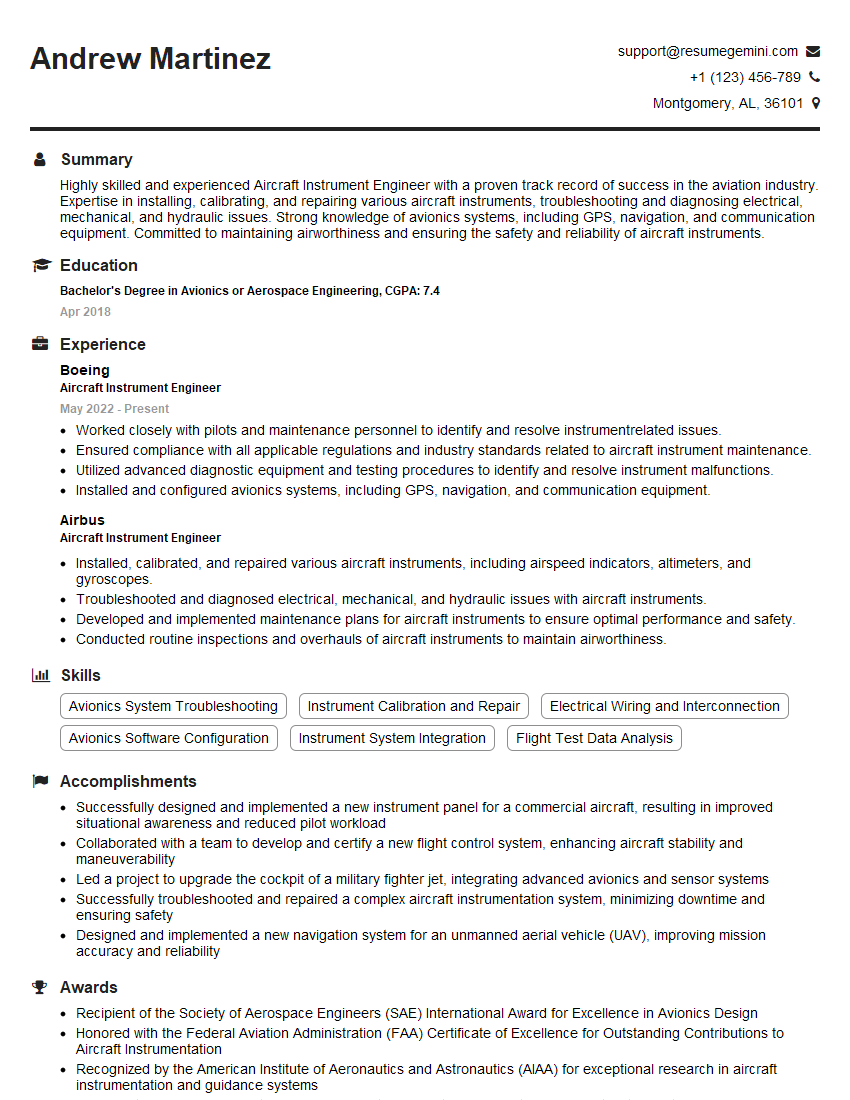Are you a seasoned Aircraft Instrument Engineer seeking a new career path? Discover our professionally built Aircraft Instrument Engineer Resume Template. This time-saving tool provides a solid foundation for your job search. Simply click “Edit Resume” to customize it with your unique experiences and achievements. Customize fonts and colors to match your personal style and increase your chances of landing your dream job. Explore more Resume Templates for additional options.

Andrew Martinez
Aircraft Instrument Engineer
Summary
Highly skilled and experienced Aircraft Instrument Engineer with a proven track record of success in the aviation industry. Expertise in installing, calibrating, and repairing various aircraft instruments, troubleshooting and diagnosing electrical, mechanical, and hydraulic issues. Strong knowledge of avionics systems, including GPS, navigation, and communication equipment. Committed to maintaining airworthiness and ensuring the safety and reliability of aircraft instruments.
Education
Bachelor’s Degree in Avionics or Aerospace Engineering
April 2018
Skills
- Avionics System Troubleshooting
- Instrument Calibration and Repair
- Electrical Wiring and Interconnection
- Avionics Software Configuration
- Instrument System Integration
- Flight Test Data Analysis
Work Experience
Aircraft Instrument Engineer
- Worked closely with pilots and maintenance personnel to identify and resolve instrumentrelated issues.
- Ensured compliance with all applicable regulations and industry standards related to aircraft instrument maintenance.
- Utilized advanced diagnostic equipment and testing procedures to identify and resolve instrument malfunctions.
- Installed and configured avionics systems, including GPS, navigation, and communication equipment.
Aircraft Instrument Engineer
- Installed, calibrated, and repaired various aircraft instruments, including airspeed indicators, altimeters, and gyroscopes.
- Troubleshooted and diagnosed electrical, mechanical, and hydraulic issues with aircraft instruments.
- Developed and implemented maintenance plans for aircraft instruments to ensure optimal performance and safety.
- Conducted routine inspections and overhauls of aircraft instruments to maintain airworthiness.
Accomplishments
- Successfully designed and implemented a new instrument panel for a commercial aircraft, resulting in improved situational awareness and reduced pilot workload
- Collaborated with a team to develop and certify a new flight control system, enhancing aircraft stability and maneuverability
- Led a project to upgrade the cockpit of a military fighter jet, integrating advanced avionics and sensor systems
- Successfully troubleshooted and repaired a complex aircraft instrumentation system, minimizing downtime and ensuring safety
- Designed and implemented a new navigation system for an unmanned aerial vehicle (UAV), improving mission accuracy and reliability
Awards
- Recipient of the Society of Aerospace Engineers (SAE) International Award for Excellence in Avionics Design
- Honored with the Federal Aviation Administration (FAA) Certificate of Excellence for Outstanding Contributions to Aircraft Instrumentation
- Recognized by the American Institute of Aeronautics and Astronautics (AIAA) for exceptional research in aircraft instrumentation and guidance systems
- Awarded the Silver Medal by the Royal Aeronautical Society for innovation in aircraft instrument design
Certificates
- FAA Part 145 Repair Station Certificate
- FAA Airframe and Powerplant (A&P) License
- AS9100D Aerospace Quality Management System Certification
- ISO 9001 Quality Management System Certification
Career Expert Tips:
- Select the ideal resume template to showcase your professional experience effectively.
- Master the art of resume writing to highlight your unique qualifications and achievements.
- Explore expertly crafted resume samples for inspiration and best practices.
- Build your best resume for free this new year with ResumeGemini. Enjoy exclusive discounts on ATS optimized resume templates.
How To Write Resume For Aircraft Instrument Engineer
- Highlight your technical skills and experience in aircraft instrument maintenance and repair.
- Quantify your accomplishments with specific metrics to demonstrate your impact on aircraft safety and performance.
- Showcase your knowledge of avionics systems and industry regulations.
- Include relevant certifications and professional development to demonstrate your commitment to continuous learning.
Essential Experience Highlights for a Strong Aircraft Instrument Engineer Resume
- Installed, calibrated, and repaired various aircraft instruments, including airspeed indicators, altimeters, and gyroscopes.
- Troubleshooted and diagnosed electrical, mechanical, and hydraulic issues with aircraft instruments.
- Developed and implemented maintenance plans for aircraft instruments to ensure optimal performance and safety.
- Conducted routine inspections and overhauls of aircraft instruments to maintain airworthiness.
- Worked closely with pilots and maintenance personnel to identify and resolve instrument-related issues.
- Ensured compliance with all applicable regulations and industry standards related to aircraft instrument maintenance.
- Utilized advanced diagnostic equipment and testing procedures to identify and resolve instrument malfunctions.
Frequently Asked Questions (FAQ’s) For Aircraft Instrument Engineer
What are the primary responsibilities of an Aircraft Instrument Engineer?
Aircraft Instrument Engineers are responsible for installing, calibrating, repairing, and maintaining aircraft instruments to ensure their accuracy and reliability. They also troubleshoot and diagnose electrical, mechanical, and hydraulic issues with aircraft instruments, and develop and implement maintenance plans to ensure optimal performance and safety.
What are the qualifications required to become an Aircraft Instrument Engineer?
Typically, an Aircraft Instrument Engineer requires a Bachelor’s Degree in Avionics or Aerospace Engineering, along with relevant experience in aircraft instrument maintenance and repair. Additionally, certifications and professional development are highly valued in this field.
What are the key skills required for an Aircraft Instrument Engineer?
Key skills for an Aircraft Instrument Engineer include expertise in avionics system troubleshooting, instrument calibration and repair, electrical wiring and interconnection, avionics software configuration, instrument system integration, and flight test data analysis.
What are the career prospects for an Aircraft Instrument Engineer?
Aircraft Instrument Engineers are in high demand due to the critical role they play in ensuring aircraft safety and performance. With experience, they can advance to senior-level positions, such as Avionics Maintenance Manager or Chief Instrument Engineer.
What are the top companies that hire Aircraft Instrument Engineers?
Top companies that hire Aircraft Instrument Engineers include Boeing, Airbus, Lockheed Martin, and Northrop Grumman.